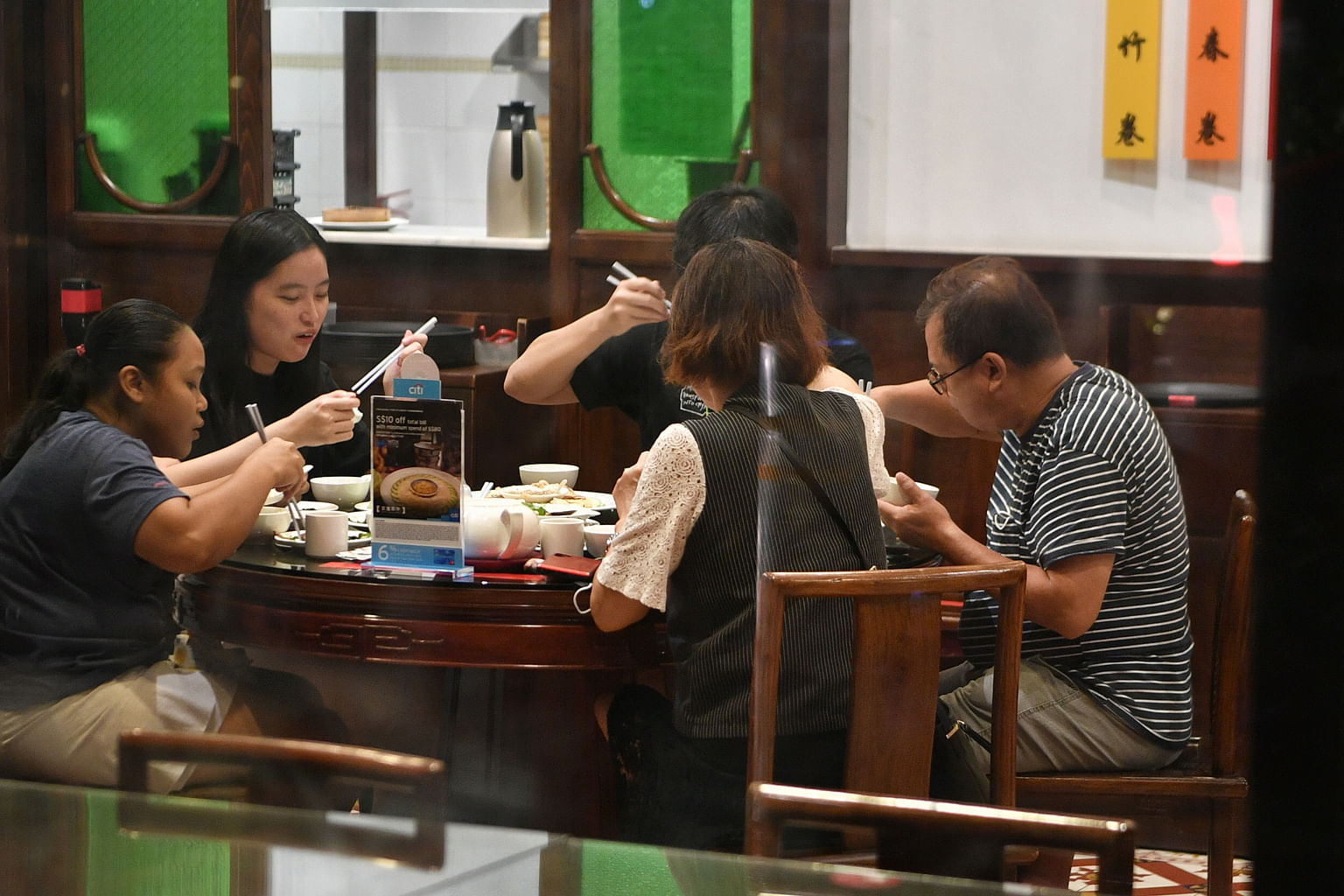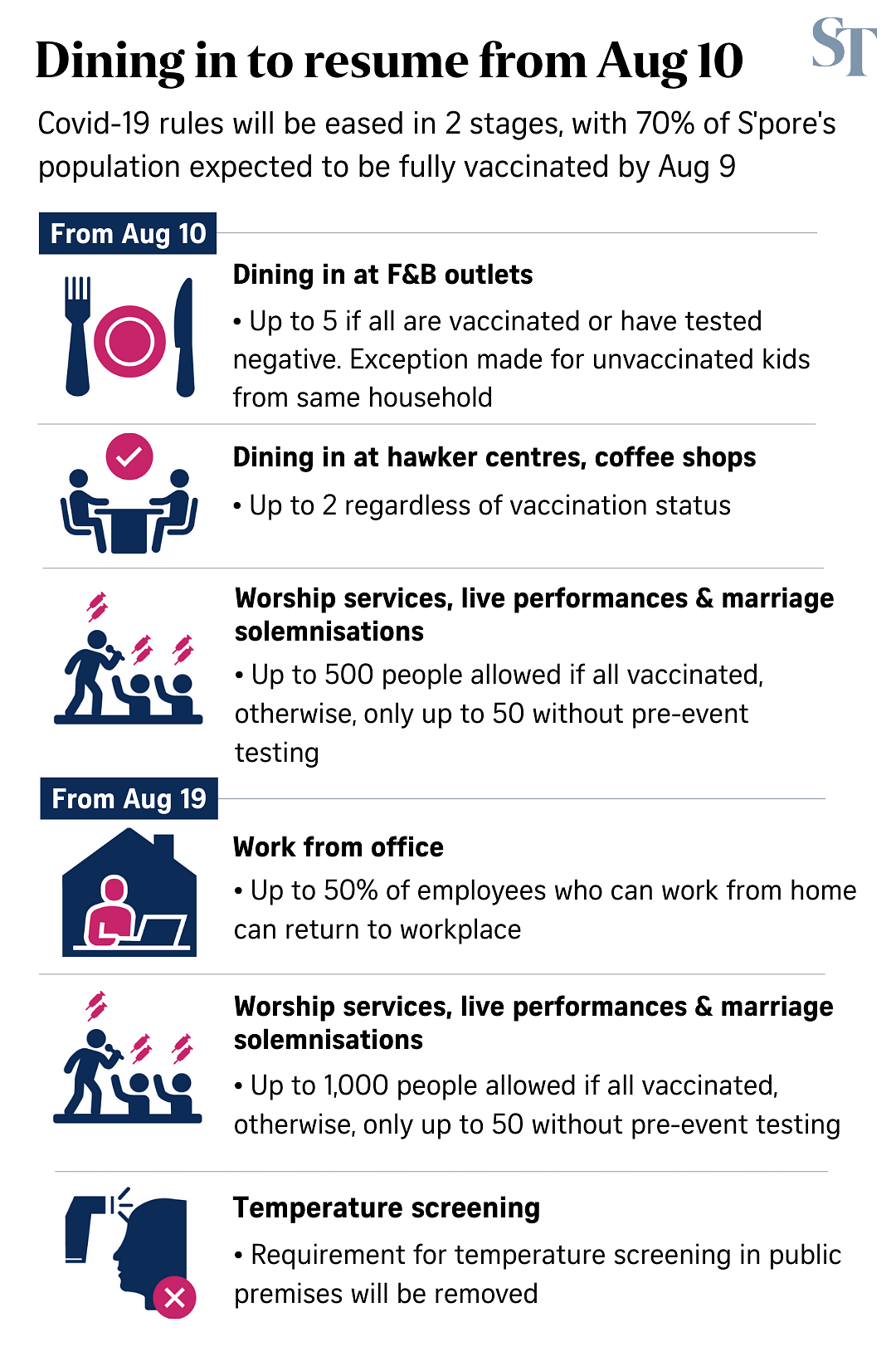S'pore to allow dining in from Aug 10, group size cap eased to 5 for those fully vaccinated
Sign up now: Get ST's newsletters delivered to your inbox

Fully vaccinated individuals will be allowed to dine in at eateries in groups of up to five from Aug 10, 2021.
ST PHOTO: ARIFFIN JAMAR
SINGAPORE - Singapore will allow people to dine at eateries in groups of up to five from next Tuesday (Aug 10) if they are fully vaccinated, in the first step of the country's road map towards reopening its economy.
The cap on group sizes for social gatherings will be raised from two to five, and households will be able to receive up to five distinct visitors.
Fully vaccinated individuals will also be able to take part in other higher-risk activities where masks are removed, as well as larger events.
Those who are not vaccinated but have valid negative pre-event test results will be allowed to join such groups of five, as well as those who have recovered from Covid-19.
Trade and Industry Minister Gan Kim Yong said in a press conference that everyone will be able to dine at hawker centres and coffee shops regardless of vaccination status - but only in groups of two people.
Unvaccinated individuals are allowed to eat at hawker centres and coffee shops because these places are open and naturally ventilated, said the Ministry of Health.
This easing of measures is possible because Singapore expects around 70 per cent of its population to have received both vaccine doses by National Day, said Health Minister Ong Ye Kung on Friday (Aug 6).
If the situation remains stable, permitted event sizes and capacity limits for malls and attractions will further increase nine days later, on Aug 19.
At that time, companies will be able to allow up to 50 per cent of staff who are currently working remotely to return to the office.
This preparatory stage will last for about a month from Aug 10 to early September, and is the first stage in Singapore's four-step transition to becoming a Covid-19-resilient nation, said Mr Ong.
By early September, when around 80 per cent of the population is likely to have been vaccinated, the country will be ready to move to what the minister termed "transition stage A".
This is when the economy will be further opened up, with more social activities and even travel able to take place. But in doing so, Singaporeans must be mentally prepared for the number of cases and deaths to rise, he added.
"But we can do our best to minimise the incidence of severe illnesses and deaths, and it is therefore very important that we continue to vaccinate as many people as possible."
This means the country will continue to differentiate among individuals by vaccination status, with Singapore maintaining a strong system of surveillance testing for travellers.
Wastewater testing will be expanded, and the general public should get used to rostered routine testing, which will help slow virus transmission, said Mr Ong.
If these measures work well, Singapore will be able to move to transition stage B, before finally reaching a new normal, said Mr Ong, who co-chairs the multi-ministry task force handling the pandemic, along with Mr Gan and Finance Minister Lawrence Wong.
"The transition road map will therefore be a very careful balance between lives and livelihoods," he added. "Ours will be a step-by-step approach, feeling our way forward, making judgment calls."

PHOTO: ST READER
With more of the population vaccinated, Singapore will also be taking a more inclusive approach to recognising vaccines, meaning that those who have been fully inoculated with vaccines under the World Health Organisation's (WHO) Emergency Use Listing will also benefit from these relaxed measures.
These include vaccines such as China's Sinovac vaccine, which is currently not under Singapore's nationwide vaccination programme. The Sinopharm and AstraZeneca vaccines are also on the WHO list.
A person is considered fully vaccinated two weeks after his second dose.
Mr Ong said the nationwide vaccination rate was slightly more than 40 per cent when large Covid-19 clusters broke out in mid-July.
It was therefore necessary to tighten restrictions and revert to phase two (heightened alert) to prevent further transmission of the virus, he said.
"As a result, we prevented a possible uncontrollable rise in infections, severe illnesses and deaths."
Recalling his fear that Singapore would see the number of Covid-19 patients increase exponentially, Mr Ong added: "We managed to avert that scary scenario."
However, Singapore is also starting to see a few fully vaccinated individuals who have become severely ill, he observed.
"Unfortunately, this is inevitable. As the great majority of our population is now vaccinated... more people will get infected and some of them may have pre-existing illnesses and conditions that make them more susceptible to severe illnesses."
Even so, the country's current situation shows several positive signs. These include a stable number of daily infections, with more infected individuals isolated before detection or being infected at home, rather than out in the community, Mr Ong said.
Mr Gan urged caution and vigilance, noting that the number of Covid-19 cases around the world continues to grow and there continues to be the risk of a new variant emerging.
"If we assess that the healthcare system may be under stress, we may then need to slow down the pace of our opening," he added.
"We may sometimes may even have to impose additional measures to give us time and space to allow our healthcare system to continue to be able to function effectively."



